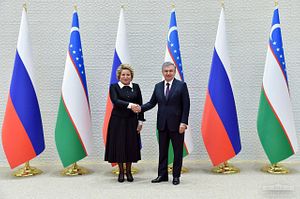On October 2, following her meeting with Uzbek President Shavkat Mirziyoyev, Valentina Matviyenko, chairwoman of the Russian Parliament’s Federation Council, announced that Uzbekistan was working on the issue of joining the Eurasian Economic Union (EAEU) at Mirziyoyev’s instruction. Although it was clarified later that Uzbekistan is merely exploring the option of joining the EAEU, in the words of Matviyenko, Uzbekistan’s accession was a fait accompli as she expressed her hope about Uzbekistan’s accession without delay.
Matviyenko’s announcement rattled both those inside and outside Uzbekistan. The Russian politician’s statement revealed that matters of possible Uzbek membership in the EAEU are debated not only within the government of Uzbekistan, but bilaterally with Russians at a senior level within a working group headed by Russian Minister of Finance Anton Siluanov. Earlier this year Mirziyoyev spoke about considering the possible benefits and losses from EAEU membership. Mirziyoyev’s reform program is predicated on economic expansion and finding new markets for Uzbek goods; it comes against a backdrop of the EAEU increasingly restricting imports from non-member states.
That the announcement of negotiations on a such consequential matter for Uzbekistan was made by Moscow ahead of Tashkent was viewed by some as a clear indication of disrespect for Uzbekistan’s own political processing of the issue. Moreover, as Tashkent tries to weigh its decision carefully, Matviyenko’s statement read as if Uzbekistan had already decided and the issue of accession was only a matter of time.
Tashkent’s deliberations on EAEU membership come as its neighbors, and members already, struggle with the group’s focus on expansion over utility. At a meeting of the EAEU heads a day before Matviyenko’s statement about Uzbekistan, Kazakh President Kasym-Jomart Tokayev called on the group to focus on the quality of cooperation and expanding trading opportunities for the organization rather than expanding the membership to other countries. Kyrgyz President Sooronbay Jeenbekov, for his part, noted that member countries are busy arguing with each other instead of being concerned about true economic cooperation with each other.
The timing and content of Matviyenko’s statement suggests Russian pressure on Uzbekistan. To downplay this interpretation, Uzbek Senator Sodiq Safoev said at a press conference that the president of Uzbekistan was a strong and independent leader and has acted solely to the benefit of Uzbekistan. He said that no pressures were asserted on Tashkent. Tashkent appears confident in its ability to negotiate with Russia on the EAEU matter, but Moscow has experience in getting its way — as evidenced by the existing Central Asian EAEU members.
Uzbek membership in the EAEU will likely feed a split among the country’s politicians and elites. As in other countries, there are pro-EAEU and anti-EAEU camps; the latter likely frustrated with Mirziyoyev’s apparent entertaining of the option of membership. Because the EAEU is a weak organization in many respects, Uzbekistan’s membership would mostly benefit Russia insofar as the organization is a political vanity project more than a useful economic cooperative mechanism. In turn, the costs would accrue to Uzbekistan. One simply must look at the source of complaints about the EAEU: members expect Russia struggle with the organization, Russia does not. Moscow can easily outmaneuver Tashkent.
Uzbekistan could find itself trapped in the EAEU arrangement and subject to increased Russian control. The markets Uzbekistan seeks to access are either heavily controlled by Russia or require Russian acquiescence to access. This puts Moscow in a position of power and if the past holds any precedent, Russia will play unfairly if it desires to. In addition, while cheaper Uzbek projects may do well in Russian markets, superior Russian products could dominate the Uzbek market just as easily.
Matviyenko’s statement was uncoordinated with the government of Uzbekistan and could even be a tactical move on the part of Moscow. Matviyenko’s statement was not only disrespectful toward Uzbekistan’s political processing of EAEU membership but feeds a continuation of Russia’s paternalistic attitude toward a former vassal state. Clearly, Moscow wants Tashkent in the EAEU and is willing to lean on Uzbekistan to receive a “yes” — but what’s best for Uzbekistan?

































